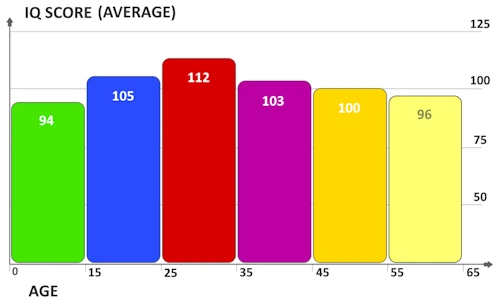
Lights and Shadows of IQ Tests: a Critical Look
The concept of human intelligence is a captivating and intricate trait that is typically evaluated through Intelligence Quotient (IQ) examinations. These assessments are designed to evaluate an individual’s cognitive capacities, including their problem-solving abilities and logical thinking skills. Although IQ scores offer valuable information, they also prompt interesting discussions and inquiries.
A Brief Overview of IQ Tests
IQ tests originated in the early 1900s, devised by French psychologist Alfred Binet, with the primary aim of assessing children’s ability to succeed in an academic setting. Over time, these tests have undergone significant evolution, accommodating an array of cognitive skills. Nevertheless, the fundamental objective remains the measurement of an individual’s capacity to comprehend and apply logical principles.
Understanding the IQ Scale: The Significance of Your IQ Score
The IQ scale is based on a standardized system with a median score of 100. The mean score is situated within one standard deviation of the mean, which is between 85 and 115. This accounts for approximately 68% of the population. A score below 70 may be indicative of a lack of intellectual ability, while a score above 130 is classified as a high or genius IQ score.
IQ Score Ranges
130 and above: High IQ
90-110: Average IQ
80-90: Below Average IQ
70 to 80: Borderline
Below 70: May indicate intellectual deficiency

The Calculation of IQ Scores
Traditionally, IQ scores were determined by dividing an individual’s mental age by their actual age and then multiplying the result by 100. However, contemporary approaches involve evaluating an individual’s results in comparison to their peers in the same age bracket. This method, referred to as standardization, enables a significant and meaningful assessment and understanding of IQ scores.
The Components of IQ Tests: Assessing Logical Reasoning
These tests frequently assess logical reasoning by examining patterns, sequences, and the connections between symbols and shapes. Typical examples of such problems include analogies, classifications, and series, which assess an individual’s capacity to apply logical reasoning. The capacity to identify underlying patterns and apply logic in novel contexts is indicative of an individual’s overall intelligence.
Validity of Measuring Logical Reasoning Through IQ Tests
Although IQ tests are widely used, there is debate over their effectiveness in accurately assessing an individual’s logical reasoning skills. A number of studies have demonstrated a significant correlation between high IQ scores and success in academic and professional environments, indicating some level of validity. Nevertheless, some critics contend that logical reasoning is a complex concept that cannot be fully captured by a single, standardized test.
Deconstructing Logical Reasoning within IQ Tests
IQ tests comprise a variety of questions designed to assess an individual’s logical reasoning abilities. These include tests of deductive and inductive reasoning, mathematical problem-solving, and spatial awareness. Deductive reasoning questions require the use of general principles to solve specific cases, whereas inductive reasoning questions necessitate the identification of rules from specific situations.
Can IQ Change Over Time?
The hypothesis that IQ remains constant has been subject to scrutiny over time. The results of research indicate that participation in activities that stimulate the brain can enhance cognitive abilities, such as logical thinking. Consequently, although IQ tests may provide a transient evaluation of an individual’s cognitive abilities, they may not definitively ascertain their long-term capacity for logical reasoning.
Understanding Your IQ Score: Considering Contextual Factors
n order to properly interpret intelligence quotient scores, it is important to take into account the surrounding context. It is important to consider the potential impact of various factors on the results, including cultural heritage, level of education, and familiarity with the test format. Consequently, while an IQ score may indicate a certain degree of logical reasoning skills, it should not be viewed as a definitive measure of intelligence.
Criticisms and Limitations of IQ Tests
Critics of IQ tests point to several limitations, especially regarding their ability to measure logical reasoning. Tests can be biased against certain groups who may not have had the same educational opportunities or cultural experiences as others. Additionally, test anxiety can significantly affect performance, potentially underestimating a person’s true logical reasoning skills.
The limits of IQ calculation
In the past, IQ was believed to be mainly related to abstract reasoning ability, such as solving complex mathematical problems. Today, however, we understand that we cannot examine only its logical aspect, but we need a broader view; so much so that it is impossible to uniquely define the facets that constitute the intellect.
Multiple intelligences
The theory of multiple intelligences, developed by Howard Gardner in the 1980s, suggests that human intelligence cannot be reduced to a single number, but manifests itself in several forms, including:
linguistic intelligence: the ability to use written and spoken language effectively, including understanding terminology and learning foreign languages;
logical-mathematical intelligence: the faculty of logical reasoning, solving mathematical problems and understanding scientific concepts;
visual-spatial intelligence: the gift of visualizing objects and mental images, orienting oneself in space and creating graphic representations;
musical intelligence: the ability to perceive, understand and create music;
bodily-kinesthetic intelligence: the ability to use one’s body in a skillful and coordinated manner, excelling in physical activities such as sports, dance, martial arts or handwork;
emotional (or interpersonal) intelligence: the attitude of understanding others, relating well to people and working effectively in groups. Those who possess it are empathetic and have good communication skills;
intrapersonal intelligence: the talent to understand oneself, reflect on one’s thoughts and feelings, and manage one’s emotions and motivations.
The Role of IQ Tests in Modern Society
Despite the ongoing discussions regarding their effectiveness, IQ tests continue to be a commonly used tool for evaluating logical thinking. Their impartial nature makes them attractive in situations where a standardized evaluation is required, despite the fact that this approach may not fully capture an individual’s intellectual abilities.
The decline in IQ
According to studies by U.S. psychologist James Robert Flynn done in the 1980s, there was a steady increase in IQ during the twentieth century, averaging 3 points every 10 years. This trend has changed since 1970, when the gradual decline in the average IQ of the population began. Many scholars have wondered about possible causes, such as deteriorating quality of education, drug use, excessive use of technological tools and impoverishment of language.
The influence of technology
In recent decades there has been an exponential growth of technology, which is no longer used sporadically to facilitate certain tasks, but rather on a daily basis. People used to be more skilled and able to make do, but today they rely 100% on technological devices. Some small but very emblematic examples of how logical abilities have diminished compared to the past: once individuals could read maps, today they rely on a satellite navigator to get around; once they memorized the most important phone numbers, today they save them on their cell phones without being able to remember them.
Language Impoverishment
Several studies show the correlation between decreased lexical knowledge and the ability to formulate and process thought.
The loss and reduction of vocabulary and linguistic simplification are rampant and impair the ability to implement complex and thorough reasoning. In general, people read little, preferring short texts, as they are no longer accustomed to staying focused and understanding the content. Oversimplifying language is a step backward for the human intellect; one must be aware that the richness of language is essential for depth of thought.

The Language of Totalitarianisms
Restricting vocabulary, attributing new meanings to words or inventing new ones is typical of a propagandistic and authoritarian system that aims to limit freedom of thought through linguistic restriction. History is full of totalitarian regimes that manipulated the thinking of their peoples. Literature also describes well certain aspects of the impoverishment of language in dictatorships, for example, George Orwell in his dystopian novel 1984 tells how the regime creates a new language, and Ray Bradbury in Fahrenheit 451 tells of a future in which books are burned to prevent people from starting new ideas different from those popularized.
Enhancing Logical Reasoning Skills to Boost IQ Scores
Those seeking to enhance their IQ scores may find it beneficial to prioritize the development of their logical reasoning abilities. Engaging in brain-training exercises, critical thinking tasks, and exposure to diverse problem-solving scenarios can be effective in this regard. Additionally, familiarity with the structure and content of IQ tests may also contribute to improved performance.
The Future of Logical Reasoning Assessment
As we progress into the 21st century, advancements in technology and science may lead to changes in the way we conduct IQ tests and evaluate logical reasoning skills. With the development of ethical AI, virtual reality, and advanced neuroimaging, there may be new opportunities for more inclusive and unbiased assessments of logical reasoning.
In Conclusion
Intelligence quotient (IQ) tests are used as a standardized way of measuring logical intelligence, along with other cognitive abilities. While they provide valuable insights, it is crucial to acknowledge their limitations and the effects of external factors on the test results. A more comprehensive approach is needed, one that takes into account the complex and diverse nature of human intelligence. Keep in mind that IQ is only one aspect of your cognitive makeup, and with the proper tools and mindset, there is always potential for improvement and progress. We must strive to develop our skills in both logic and language in order to improve and progress as conscious human beings.
Our staff has developed a logical intelligence test with no time limit that can provide an estimate of your IQ while being both fluent and varied. The seemingly simple questions hide pitfalls, so don’t underestimate it.
If you are under 16, we also recommend you to try the Youth Wisdom Test to check your maturity level.
TAKE THE LOGICAL INTELLIGENCE TEST
TAKE THE YOUTH WISDOM TEST
MINI-TEST: WHAT IS YOUR LEVEL OF LOGICAL INTELLIGENCE?
Answer all the questions and choose only one answer for each.
1. If John is taller than Mike and Mike is taller than Sarah, who is the shortest among them?
2. If all roses are flowers and some flowers fade quickly, which of the following statements must be true?
3. If a book costs $20 and is on sale for 25% off, how much does it cost after the discount?
4. If an athlete runs at a speed of 5 meters per second, how long will it take him to cover 600 meters?
5. Which number logically follows this series: 2, 6, 12, 20 …?
The correct answers are those corresponding to the letter B. So, count how many times you selected answer B and find your profile below.
0: Logic is not your strong point! (very low IQ)
1-2: Your logic skills are poor (barely below average IQ)
3-4: You have good logical skills (average IQ)
5: You are a master of logic! (above average IQ)
